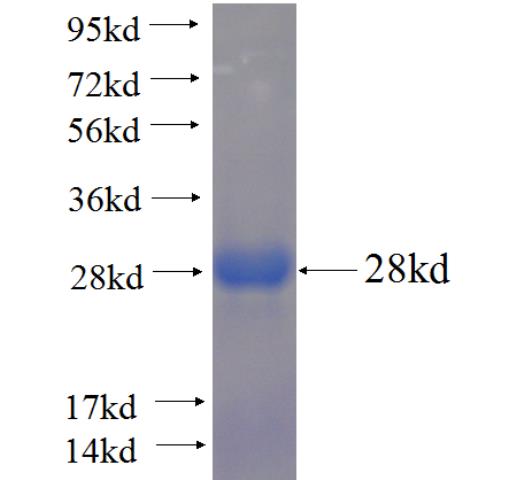-
Product Name
Human CHGA Recombinant protein (His tag)
- Documents
-
Description
Pancreastatin: Strongly inhibits glucose induced insulin release from the pancreas.; Catestatin: Inhibits catecholamine release from chromaffin cells and noradrenergic neurons by acting as a non-competitive nicotinic cholinergic antagonist (PubMed:15326220). Displays antibacterial activity against Gram-positive bacteria S.aureus and M.luteus, and Gram-negative bacteria E.coli and P.aeruginosa (PubMed:15723172 and PubMed:24723458). Can induce mast cell migration, degranulation and production of cytokines and chemokines (PubMed:21214543). Acts as a potent scavenger of free radicals in vitro (PubMed:24723458). May play a role in the regulation of cardiac function and blood pressure (PubMed:18541522). {PubMed:15326220, PubMed:15723172, PubMed:21214543, PubMed:24723458, PubMed:18541522}.; Serpinin: Regulates granule biogenesis in endocrine cells by up-regulating the transcription of protease nexin 1 (SERPINE2) via a cAMP-PKA-SP1 pathway. This leads to inhibition of granule protein degradation in the Golgi complex which in turn promotes granule formation. {UniProtKB:P26339}.
-
Protein name
Chromogranin-A
-
Uniprot ID
P10645
-
Gene Name
CHGA
-
Source/Expression Host
E. coli
-
Expression Plasmid/cDNA
A DNA sequence encoding the human CHGA (XP_054231265.1) 19-225 aa was fused with the polyhistidine tag
-
Protein Species
Human
-
Activity
Not tested.
-
Validations

Recombinant human CHGA SDS-PAGE
Related Products / Services
Please note: All products are "FOR RESEARCH USE ONLY AND ARE NOT INTENDED FOR DIAGNOSTIC OR THERAPEUTIC USE"
